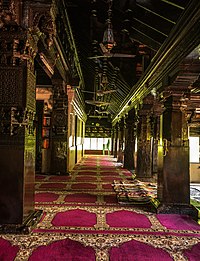Yusuf Bengali
Yusuf Bengali | |
|---|---|
ইঊসুফ বাঙ্গালী | |
| Other names | Yusuf Bangali |
| Personal | |
| Born | Yusuf |
| Resting place | Burhanpur, India |
| Religion | Islam |
| Flourished | 16th century |
| Children | Abdullah Abdur-Rahman |
| Denomination | Sunni |
| Other names | Yusuf Bangali |
| Order | Shattari |
| Senior posting | |
| Teacher | Wajihuddin Alvi |
| Based in | Ahmedabad |
Students
| |
Influenced by
| |
![]() Search Yusuf Bengali on Amazon.
Search Yusuf Bengali on Amazon.
Mufti Yūsuf Bangālī (Bengali: ইঊসুফ বাঙ্গালী, Persian: یوسف بنگالی) was a 16th-century Sufi pir of the Shattari order.[2] He was a prominent teacher during the reign of the Farooqui dynasty and Mughal emperor Akbar.[3]
Background[edit]
Yusuf originated from Bengal. He travelled across the subcontinent for further Islamic studies, eventually becoming a student and disciple of Wajihuddin Alvi, who was also the teacher of Usman Bengali.[4] After gaining sufficient training from Alvi, he was permitted to migrate to Burhanpur where he maintained a khanqah as well as a madrasa.[5][3]
Yusuf became one of the most prominent scholars of the Shattari order of Bengali descent, others being Ali Sher of Sylhet and Shah Manjhan of Lakhnauti.[3] Pir Muhammad bin Abdul Halim was a longtime student of Yusuf, and Isa Burhanpuri was another notable student of Yusuf Bengali. Yusuf would also circumcise Muslim children after their birth, and most notably, Yusuf circumcised Sakah Ji Burhanpuri who would later become a leading Islamic scholar in Burhanpur.[6] Although Yusuf had many students, he did not accept anyone to be his murid (disciple), and instead directed his followers to his contemporary Tahir Yusuf Sindhi. He also had the same mentality for his two sons, Abdullah and Abdur-Rahman, both of whom became disciples of Sindhi.[4]
Spiritual genealogy[edit]
Yusuf was a disciple of Wajihuddin Alvi.[2]
See also[edit]
- Usman Bengali, another 16th-century Bengali Muslim scholar who moved to North India
References[edit]
- ↑ al-Lucknawi (1999), p. 505.
- ↑ 2.0 2.1 Ghazi, Syed Abdullah Shah, Hazrat Shah Muhammad Ghous Gwalior, India
- ↑ 3.0 3.1 3.2 Quddusi, Mohammad Ilyas (2002). Khandesh Under the Mughals, 1601-1724 A.D.: Mainly Based on Persian Sources. New Delhi: Islamic Wonders Bureau. pp. 122–136. Search this book on

- ↑ 4.0 4.1 (۶۰۸) یاد شیخ یوسف بنگالی رحمہ اللہ. Gulzar-e-Abrar (in اردو). pp. 358–359. Search this book on

- ↑ Qazi Moin Uddin Ahmad (1963). History of the Shattari Silsila. Aligarh Muslim University. pp. 140–141, 272. Search this book on

- ↑ al-Lucknawi (1999), p. 534.
Bibliography[edit]
- al-Lucknawi, Abd al-Hayy (1999). Nuzhat al-khawatir (in العربية). Beirut, Lebanon: Dar Ibn Hazm. Search this book on

This article "Yusuf Bengali" is from Wikipedia. The list of its authors can be seen in its historical and/or the page Edithistory:Yusuf Bengali. Articles copied from Draft Namespace on Wikipedia could be seen on the Draft Namespace of Wikipedia and not main one.


